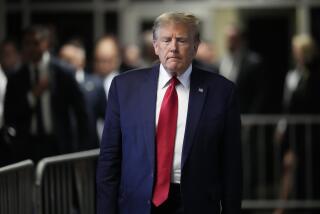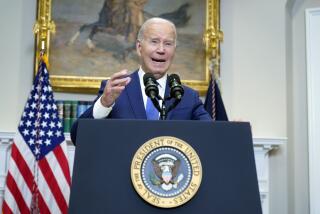Reagan Held Unaware of Lie Test Scope : Disclosure of Order Even Surprised Top Officials, Sources Say
WASHINGTON — President Reagan has said privately that he was not fully aware of the sweeping nature of the order he signed Nov. 1 requiring that thousands of government workers with access to highly classified information take routine polygraph examinations, Administration sources said Monday.
The order also was signed without the knowledge of some top White House officials who have opposed the tests, the sources said.
White House counsel Fred F. Fielding, one of the President’s top advisers on legal issues, was among those not informed of the polygraph provisions in National Security Decision Directive 196 at the time Reagan signed the secret order, the sources said.
‘Who Did Know?’
Disclosure of the order in news reports surprised many other senior White House aides. “The question is: who did know?” one aide asked Monday.
Secretary of the Treasury James A. Baker III, a National Security Council member who objected to polygraph tests when he was White House chief of staff, was described by sources as busy with the tax-overhaul bill and not present at one of the key meetings leading to the order.
The still-secret order was devoted largely to other measures to combat espionage against the United States. Reagan apparently focused on those, rather than the section that would have significantly broadened use of polygraphs for government workers and contractor personnel.
The expanded use of polygraphs was advocated by CIA Director William J. Casey and Defense Secretary Caspar W. Weinberger, among others. Reagan approved it after being told that the United States faces an intensifying espionage threat and must take more aggressive action against it.
Used in Spy Probes
Polygraphs have been used commonly in specific espionage investigations and by the CIA and the National Security Agency. Reagan’s order would have authorized their use on a much broader basis, applying them to “all individuals” with access to three categories of highly classified information.
Reagan scaled back the order Friday after Secretary of State George P. Shultz threatened to resign if asked to take the polygraph test. Shultz had joined Baker in opposing expanded use of the so-called “lie detector” test in Reagan’s first term. When the specifics of the latest order were made public Dec. 11 in a news report, Fielding strongly urged that the order be amended.
Sources quoted Fielding as saying that, while using polygraphs might be legitimate in specific espionage investigations, it was wrong to use them for such broad screening as was suggested in Reagan’s order.
Other officials also said privately that they believed that the order had not been adequately checked by the White House staff for legal and political implications, given controversy in the courts and in Congress about the effectiveness and use of polygraphs.
Previous Order Withdrawn
A previous Reagan order requiring government officials to submit to polygraphs was withdrawn in February, 1984, after a congressional uproar.
While advocates say that they are a useful tool in investigations, critics contend that polygraphs are inaccurate and can be evaded.
A high-level official said that public disclosure this time of the polygraph order set off such strong objections from the White House staff and top Administration officials that Reagan was prepared to reverse himself even as Shultz spoke out publicly.
The President’s order, which grew out of an Aug. 7 meeting of the National Security Planning Group, included other measures designed to combat espionage, such as tighter control on movement of Soviet and Soviet-Bloc diplomats and other personnel in this country.
It also called for gradual equalization of the number of Soviet diplomats in this country with the number of U.S. diplomats in the Soviet Union.
But the order also specified “a periodic” or irregular polygraph screening of “all individuals” with access to three categories of highly classified information: sensitive compartmentalized information (SCI), communications and security information (COMSEC) and “other special access program classified information.”
182,000 Seen Affected
The General Accounting Office estimated last year that 182,000 people would be subject to polygraph tests under these definitions.
Reagan’s order specified that an inter-agency group be established to implement the order. When the group first met, the issue was not even brought up, sources said.
In the second meeting, a State Department official expressed reservations, as had Shultz in earlier private meetings. At the third meeting, the group decided to wait until January to deal with the controversial issue.
More to Read
Sign up for Essential California
The most important California stories and recommendations in your inbox every morning.
You may occasionally receive promotional content from the Los Angeles Times.










